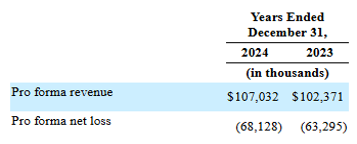Blacksky (NYSE: BKSY)’s 2024 annual report highlighted information about LeoStella, underscoring the intense competition in small satellite manufacturing.. In November 2024 Blacksky bought Thales’s 50% ownership interest in LeoStella. Prior to that, LeoStella supplied Blacksky and Loft Orbital, and was targeting government sales to SDA. However, Blacksky’s 2024 annual report reveals that LeoStella struggled to secure customers other than Blacksky itself.
Blacksky disclosed unaudited pro-forma revenue and net loss for combined Blacksky-LeoStella historical operations on page 110. The pro forma figures show a combined revenue of $102.3 million in 2029, which is $7.9 million more than Blacksky’s standalone revenue for that year. In 2023, Blacksky made $23.9 million in payment to LeoStella. Some of this amount likely was for revenue LeoStella recognized prior to 2023. By approximating LeoStella’s 2023 revenue from Blacksky at $23.9 million, their total revenue for that year is estimated at $31.8 million.

In 2024, pro forma revenue is $107.0 million, $4.9 million higher than Blacksky’s revenue that year. In 2024 Blacksky’s payments to LeoStella grew to $27.1 million. Thus LeoStella’s 2024 revenue apparently stayed flat at $32 million. But revenue due to Blacksky expanded to 85%.
It appears from this acquisition, Blacksky will not acquire much new revenue from LeoStella’s sales to other customers. Instead, CEO Brian O’Toole stated on the Q4 conference call this acquisition may bring down Blacksky’s satellite costs. “We expect to gain some operational efficiencies there over time as well as continued improvement in our overall cost and economics related to our satellites.”
LeoStella formed in 2018. European old-space satellite giant Thales Alenia Space once owned a two-thirds interest. Despite this heritage and backing, LeoStella reportedly achieved only $4.9 million in annual revenue from sources other than Blacksky after six years of operations in the United States. The satellite manufacturing business in the United States appears to be highly competitive.